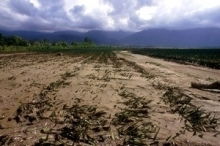° Potentially catastrophic climate impacts on food production over the long-term

Food security merits greater space in the climate change agenda
Rome, 31 March 2011
"Potentially catastrophic" impacts on food production from slow-onset climate changes are expected to increasingly hit the developing world in the future and action is needed now to prepare for those anticipated impacts, FAO warned today in a submission to the United Nations Framework Convention on Climate Change.
"Currently the world is focused on dealing with shorter-term climate impacts caused mainly by extreme weather events," said Alexander Mueller, FAO Assistant-Director General for Natural Resources.
"This is absolutely necessary," he continued. "But 'slow-onset' impacts are expected to bring deeper changes that challenge the ecosystem services needed for agriculture, with potentially disastrous impacts on food security during the period from 2050 to 2100. Coping with long-term changes after the fact doesn't make much sense. We must already today support agriculture in the developing world to become more resilient," he said.
"While these changes occur gradually and take time to manifest themselves, we can't simply ignore them," said M?ller, adding: "We need to move beyond our usual tendency to take a short-term perspective and instead invest in the long-term."
In its submission, FAO outlines steps that governments could consider in climate change negotiations to ensure that food security is not threatened.
Food insecurity as an indicator of vulnerability to climate change
FAO recommends that food security be used as an indicator of vulnerability to climate change.
Food production systems, and the ecosystems they depend on, are highly sensitive to climate variability and climate change. Changes in temperature, precipitation and related outbreaks of pest and diseases can reduce production. Poor people in countries that depend on food imports are particularly vulnerable to such effects.
"If we're looking to assess vulnerability to climate change, it makes very good sense to look at food security as one important indicator," said Mueller.
The FAO submission to the UNFCC added that: Food insecurity could be an indicator, within a broader methodology for assessing vulnerability to extreme events and slow-onset changes. FAO work on food insecurity, including its annual publication The State of Food Insecurity, prepared jointly with WFP, its work on Feeding the World in 2050 and its contribution, in the context of "Africa, Climate Change, Environment and Security" (ACCES)* to a vulnerability discussion paper wherein food security vulnerability is used as an indicator of vulnerability to climate change, could be utilized in this regard.
* Since January 2011, the Institute for Environmental Security has been serving as the International Secretariat for the Africa, Climate Change, Environment and Security (ACCES) dialogue process.
Full FAO Press Release - 31 March 2011 | FAO Submission to the UNFCCC | ACCES Briefing - 8 April 2011